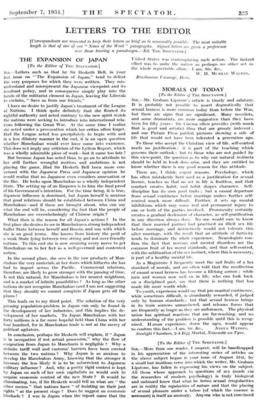LETTERS TO THE EDITOR
[Correspondents are requested to keep their letters as brief as is reasonably possible. The most suitable length is that of one of our "News of the Week" paragraphs. Signed letters are given a preference
over those bearing a pseudonym.—Ed. TITE SPECTATOR.]
THE EXPANSION OF JAPAN
[To the Editor of THE SPECTATOR.]
SIR,—Letters such as that by Sir Hesketh Bell, in your last issue on The Expansion of Japan," tend to defeat the very purposes for which they were written. They mis- understand and misrepresent the Japanese viewpoint and its resultant policy, and in consequence simply play into the hands of the militarist element in Japan, leaving the Liberals to exclaim, "Save us from our friends."
I have no desire to justify Japan's treatment of the League of Nations. I think quite definitely that she flouted its rightful authority and acted contrary to the new spirit which the nations were seeking to introduce into international rela- tions following the Great War. At the same time I realize she acted under a provocation which her critics often forget. Had the League acted less precipitately to begin with and in a less dilatory manner in the end, it is an open question whether Manchukuo would ever have come into existence. This does not imply any criticism of the Lytton Report, which was a wholly admirable piece of work—but it came too late !
But because Japan has acted thus, to go on to attribute to her still further wrongful motives and ambitions is not playing the game. Had Sir Hesketh Bell been more con- versant with the Japanese Press and Japanese opinion he would realize that no Japanese even considers annexation or the like. He looks upon Manchukuo as a wholly independent State. The setting up of an Emperor is to him the final proof of his Government's intention. For the time being, it is true, Japanese influence is dominant, but Japan herself is anxious that good relations should be established between China and Manchukuo—and if these are brought about, who can say what the end will be, considering the fact that the people of Manchukuo are overwhelmingly of Chinese origin ?
What then is the reason for all Japan's actions ? In the first place she desires to see in Manchukuo a strong independent buffer State between herself and Russia, and one with which she is on good terms. She knows from history the peril of a weak State lying between two strong and not over-friendly nations. To this end she is now straining every nerve to get Manchukuo on to her feet as a well-governed and contented nation.
In the second place, she sees in the raw products of Man- chukuo the very materials at her doors which hitherto she has had to import across the Pacific. Commercial relations, therefore, are likely to grow stronger with the passing of time. Is not this natural, for Manchukuo is her nearest neighbour, and is a market of infinite possibilities ? As long as the other nations do not recognize Manchukuo (and I am not suggesting that they should) we cannot complain if Japan gets all the plums !
This leads on to my third point. The solution of the very pressing population-problem in Japan can only be found in the development of her industries, and this implies the de- velopment of her markets. To Japan Manchukuo with her forty millions is a far more hopeful field than China with her four hundred, for in Manchukuo trade is not at the mercy of political agitators.
In conclusion, perhaps Sir Hesketh will explain, if "Japan is in occupation if not actual possession," why the flow of emigration from Japan to Manchuria is negligible ? Why a definite tariff wall and customs' barriers have been erected between the two nations ? Why Japan is so anxious to develop the Manchukuo Army, knowing that the stronger it becomes the less likely it is to be subservient to Japanese military influence ? And, why a pretty rigid control is kept by Japan on such of her own capitalists as would seek to acquire economic control of the new State ? It would be illuminating, too, if Sir Hesketh would tell us what are "the other means" that nations have "of insisting on their just rights" at the present stage ? Does he suggest an economic blockade ? I was in Japan when the report came that the
United States was contemplating such action. The instant effect was to unite the nation as perhaps no other act in the whole regrettable affair. –I am, Sir, &c., W. H. M






































 Previous page
Previous page